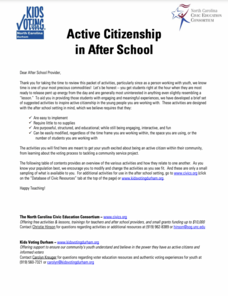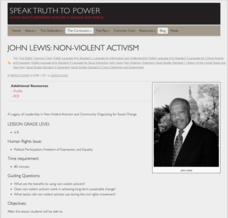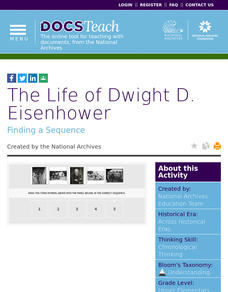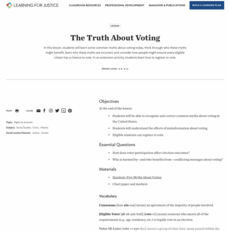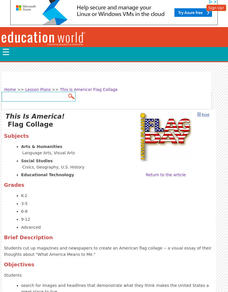DocsTeach
Analyzing a Letter About American Indian Voting Rights
An informative activity focuses on the law preventing Native Americans from voting until 1947. Scholars read documents from the Office of Indian Affairs, complete an online worksheet, and participate in group discussion. Academics learn...
Carolina K-12
Active Citizenship in After School
Active citizenship is the bedrock of any great democracy. Continue the trend by teaching the next generation about voting rights and the functions of elections in society. The variety of activities in the resource includes a human...
College Board
Civic Knowledge and Action in AP U.S. Government and Politics
Vote, it's your civic duty! The high school lesson focuses on voter turnout and civic participation with a series of activities. Young scholars analyze data to discover voter turnout trends, complete worksheets, and participate in group...
Speak Truth to Power
John Lewis: Non-Violent Activism
After comparing and contrasting non-violent and violent social movements, your young historians will take a closer look at the work and influence of John Lewis on the civil rights movement. They will then choose a current social...
DocsTeach
The Life of Dwight D. Eisenhower
A captivating activity uses images to help pupils understand the life of President Eisenhower. Scholars put the images in chronological order and read the captions to get a better understanding of the war hero turned president.
Marybeth Lobiecki
Beyond Baseball with Jackie Robinson
Jackie Robinson was more than a baseball star, he was a prominent activist. The thought-provoking resource focuses on the life and achievements of Jackie Robinson, from his baseball career to his civic participation. Academics listen and...
Maryland Department of Education
Our Children Can Soar
Amazing efforts of African American leaders are celebrated in a instructional activity on civil participation. The engaging resource focuses on primary and secondary sources to analyze the impact of African American leaders such as Ella...
DocsTeach
WWI Propaganda and Art
Uncle Sam wants you! During World War II, the US government and military created a propaganda campaign to gain public support. The activity uses primary documents such as photos to explain how and why the propaganda campaign was...
John F. Kennedy Presidential Library & Museum
Ask Not What Your Country Can Do for You
Ask not what the lesson here can do for you, but what you can do with the lesson. The answer is quite a lot! Young scholars revisit JFK's famous inaugural address with a focus on his plea for civic engagement. There's a...
Teaching Tolerance
The Truth About Voting
True or False: Only Presidential elections matter. Academics delve into common voting myths to understand what is true and why the election process is critical to democracy. The lesson uses group discussion, activities, and handouts to...
Indian Land Tenure Foundation
Leaders' Decisions and Actions
Community leaders try to make choices that protect the community and the environment. Little ones learn about how tribal communities look to their chief to guide the decision-making process. Your class will become part of the community...
Teaching Tolerance
The True History of Voting Rights
Explore what voting rights really are in an intriguing lesson that explores the history of American voting. The resource examines the timeline of voting rights in the United States with group discussions, hands-on-activities, and...
iCivics
Wanted: A Just Right Government
What type of government did American colonists gain and seek after gaining their independence after the Revolutionary War? Here is lesson that will guide your young learners through the new nation's progression from the Articles of...
Center for Civic Education
What Is Authority?
Young scholars examine the concepts of power and authority as they begin learning about government in this elementary social studies lesson. Through a series of readings, discussions, and problem solving activities, children...
DocsTeach
Martin Luther King, Jr. and the Fight for Civil Rights
Find clues to the past with photos! Young historians use a photo from one of Martin Luther King Jr.'s peaceful protests to practice photo analysis. Academics look at the image to gain clues about what is happening and why. To finish,...
Teaching Tolerance
Why Local Elections Matter
Uncle Sam wants everyone to vote in local elections! Geared toward middle and high school scholars, the resource explores voter turnout and the importance of local elections. Academics participate in group discussion, complete...
Carolina K-12
How Do I Pre-Register and Vote in North Carolina?
This practical activity helps young citizens learn about pre-registration to vote in elections, discuss the merits and flaws of the pre-registration process, and register themselves. The concluding activity has young voters creating...
Center for Civic Education
What Basic Ideas Are in the Preamble to the Constitution?
Introduce young historians to the US Constitution with this upper-elementary social studies lesson plan. Beginning with a general discussion about the role of government in society, students go on to work in small...
iCivics
We the Jury
Learners take on the roles of jurors in a civil case to evaluate evidence and determine a verdict in this engaging online interactive experience.
Carolina K-12
Choice, Conflict, and Compromise at the County level
With all the hubbub surrounding national elections, it's easy to forget the importance of local government. After learning about county governance and voter turnout for local elections, young citizens demonstrate how local...
Curated OER
This Is America! Flag Collage
In a visual essay of their thoughts about "What America Means to Me," kids of any age can create a collage about their country. Originally intended to be created physically, learners could share their projects online by using an...

